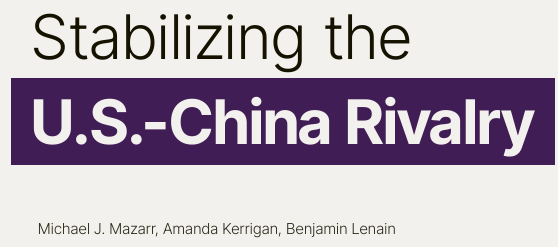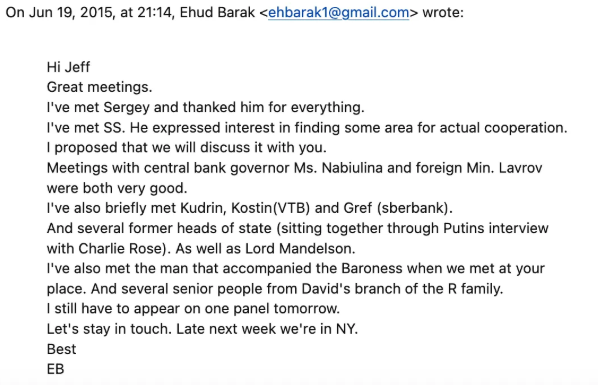

By John Helmer, Moscow
@bears_with
Question: Did a new RAND report recommending the US moderate its escalating conflict with China influence President Donald Trump’s backdown in Busan? Answer: No.
Question: Does the Russian escalation of words in defence of Venezuela and the Chinese silence deter Trump from launching his plan to kill Nicolás Maduro? Answer: not much.
Question: Do the hacked emails between Jeffrey Epstein and former Israeli prime minister and defense minister Ehud Barak reveal untold influence on the Kremlin? Answer: Not likely.
Question: Does Russian Central Bank Governor Elvira Nabiullina hold President Vladimir Putin’s purse strings to finance the war? Answer: Yes.
In this week’s opener on Reason2Resist, Dimitri Lascaris and I elaborate on these answers. Click to watch and listen: https://www.youtube.com/watch?v=P6_RVBieQ6A

Source: https://www.youtube.com/watch?v=P6_RVBieQ6A
Three junior American academics with next to no government, diplomatic, intelligence or military experience have been paid by the family money of David Richards and his son Peter Richards to read Chinese official and academic papers. The RAND think tank in California, which employs the three authors and has taken the Richards money for their “generous support of this research” have just published a 115-page outcome; here it is in full.
Their conclusion: “The RAND project staff and other U.S. participants are deeply aware of China’s hostile, predatory, and sometimes aggressive actions, and that it is imperative for the United States to stand up to specific forms of bullying and manipulation. Our focus is not on ways to transcend or overcome the essential geopolitical disagreement at the core of the rivalry. Even short of transformation, we did not assume that a comprehensive agenda for coexistence—shifting the rivalry to a much less intense form of competition—was plausible at this stage. Our goal in developing an agenda of stabilization was limited. We do not believe that collaborative coexistence is possible today. Nonetheless, reducing the risk of crises, preventing unnecessary cascading of competitive moves, and preserving limited areas for coordination can benefit both sides.”


Source: https://www.rand.org/content/dam/rand/pubs/research_reports/RRA4100/RRA4107-1/RAND_RRA4107-1.pdf
Russia, China and Venezuela
Question: On October 27, President Vladimir Putin signed a law ratifying a strategic partnership treaty with Venezuela. In line with that agreement, what will be Russia’s reaction to Washington’s threat now being demonstrated to Caracas?
Maria Zakharova: The Treaty on Strategic Partnership and Cooperation between the Russian Federation and the Bolivarian Republic of Venezuela, signed by our presidents on May 7 in Moscow, establishes a solid and reliable framework for the long-term development of our multifaceted bilateral ties. It covers a wide range of areas – political, trade, economic, and cultural – and includes defence cooperation under existing agreements, which are aimed at strengthening the defence capabilities and security of both nations. The treaty will also facilitate the conclusion of new contracts.
We stand in solidarity with the Venezuelan leadership as it safeguards its national sovereignty amid a complex international and regional situation. We maintain close contact with our partners and are willing to respond to their requests with due regard to existing or potential threats. We will continue to work shoulder-to-shoulder with Venezuela, looking to the future with confidence. We have faced such challenges before and are prepared for any developments.
Question: (Telesur) Considering the U.S. yesterday announced attack on another fishing vessel near Venezuela’s coast, which reportedly left six dead, along with the deployment of U.S. warships and a nuclear submarine in the Caribbean Sea, and Venezuela’s activation of new integral defense zones, how does the Chinese government assess the risk of potential attacks also announced by the U.S. in Venezuelan territory, and what is China’s position regarding unilateral military actions carried out without United Nations authorization?
Lin Jian: China opposes the threat or use of force in international relations and opposes external interference in Venezuela’s domestic affairs under any pretext. China supports the Proclamation of Latin America and the Caribbean as a Zone of Peace and the Declaration of Member States of the Agency for the Prohibition of Nuclear Weapons in Latin America and the Caribbean, and stands against moves that undermine peace and stability in Latin America and the Caribbean.
China supports the effort of combating cross-border crimes through stronger international cooperation, opposes the U.S. unilateral and excessive “enforcement operations” against other countries’ vessels, and calls on the U.S. to engage in normal law enforcement and judicial cooperation through bilateral and multilateral legal frameworks.
Lin made this statement on October 15 – three weeks ago. There have been daily press conferences by the spokesmen of the Foreign Ministry in Beijing since then. The latest official Chinese response on US warmaking against Venezuela came on October 28:
Question (China News Service): Recently, ten former leaders from Caribbean Community (CARICOM) member states, including former Prime Minister Patterson of Jamaica and former President Ramotar of Guyana, issued a joint statement expressing deep concern over military operations by a certain country in the Caribbean Sea. They reaffirmed the region’s status as a Zone of Peace for over 50 years, and pointed out that the United States should combat drug trafficking within the framework of the rule of law, rather than greenlighting extrajudicial executions. Prior to this, experts of the Human Rights Council’s Special Procedures and Caribbean media commentators also argued that U.S. military actions constitute the crime of extrajudicial execution. What is China’s comment on this?
Guo Jiakun: We noted relevant statement. We hope that the U.S. side will listen to the strong call of Caribbean nations and the international community, cease actions that undermine the peace and stability of the Caribbean region, and return to the path of conducting normal law enforcement and judicial cooperation within bilateral and multilateral legal frameworks.
There have been no mentions of Venezuelan President Maduro in these briefings.

The Jeffrey Epstein hustle to turn influence into Russian money which failed
It was Oscar Wilde, who knew a thing or two about paedophilia, once warned: “Everything in the world is about sex except sex. Sex is about power.” The US financier Jeffrey Epstein and the Israeli official Ehud Barak knew it too – as the public disclosure of the emails they exchanged between 2013 and 2015 now demonstrate. Read them here.
Re-reading their correspondence now, however, illustrates how powerless politically — impotent sexually (religiously too) – the combination of Epstein and Barak turned out to be. Every one of their joint schemes failed, including the meetings Barak, Epstein and Russian go-betweens arranged in 2015 with President Putin, Foreign Minister Lavrov, Central Bank Governor Elvira Nabiullina and others.

Source: https://www.dropsitenews.com/p/jeffrey-epstein-ehud-barak-putin-israel-russia-syria-war-depose-assad A search of the Dropsite reports of the hacked emails, of the Handala archive published in August 2025 by “Distributed Denial of Secrets” and of the Epstein documents released by the US Government this year has failed to reveal whom Barak and Epstein meant by the codename SS in this email. See: https://www.independent.co.uk/news/world/americas/epstein-files-pam-bondi-names-list-b2706666.html













Leave a Reply